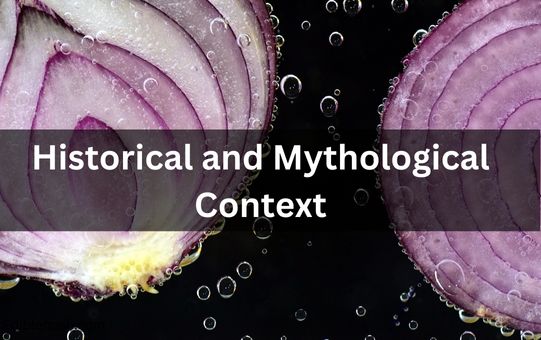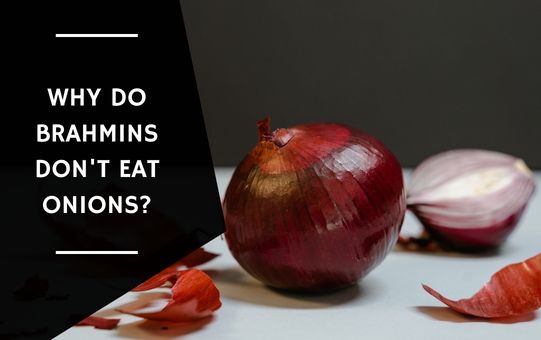There is a peculiar quality to brahmins. They do not consume onions. However, Why Do Brahmins Don’t Eat Onions in actuality? Let’s uncover the reason.
Due to historical and mythological beliefs, health concerns, and cultural norms, Brahmins, a Hindu social caste, abstain from consuming onions. Some believe that onions and garlic are “tamasic” foods with negative energy, while others believe they induce digestive issues or produce heat in the body. Consuming or avoiding onions is a personal choice that may vary by location and person.
This article will explore the numerous motivations behind this practice.
Contents
Why do Brahmins Don’t Eat Onions Matter?
Brahmins, who belong to the Hindu priestly caste, avoid eating certain foods, including onions, as part of their religious and cultural practices. The avoidance of onions and other root vegetables is a common dietary restriction among Brahmins.
There are various reasons why some Brahmins choose not to eat onions. One explanation is that these foods are considered to be Rajasic and Tamasic, meaning they can increase negative emotions and cloud one’s judgment. According to Ayurveda, these foods are also believed to be harmful to the body and mind.
In addition to their perceived negative effects, onions are also considered to have a pungent and strong odor that can interfere with the performance of priestly duties, such as conducting religious ceremonies and offering prayers. As a result, some Brahmins avoid consuming onions as a means of maintaining purity and ensuring the effectiveness of their spiritual practices.
It’s important to note that not all Brahmins follow this dietary restriction, and the practice of avoiding onions is a personal choice that may vary depending on individual beliefs and cultural practices. Nonetheless, the practice of not eating onions is an important aspect of Brahmin culture and has been observed for centuries.
Historical and Mythological Context
According to Hindu mythology, onions, and garlic were considered food for the lower classes and were avoided by the Brahmins. It was believed that consuming these foods would make a person rude, aggressive, and immoral.
Onions and garlic were also seen as “tamasic” foods, which are foods that are considered to have negative energy and are believed to promote negative qualities such as laziness and ignorance.

In contrast, the Brahmins were expected to follow a “sattvic” diet, which consists of pure, nourishing, and positive energy-filled foods that promote physical and spiritual well-being.
Read Also: What Is The Purpose Of The Onion?
Reasons why Brahmin don’t eat onions
Here are the following reasons why brahmins don’t eat onions:
Health and Digestive Reasons
Some people believe that the prohibition on onion consumption by Brahmins is due to health reasons. It is said that onions can cause indigestion and other digestive problems, and the Brahmins’ spiritual practices require them to have a clean and healthy digestive system.
Additionally, some people believe that onions produce heat in the body, which can be detrimental to the Brahmins’ spiritual practices and rituals that involve sitting in a specific posture for extended periods of time.
Social and Cultural Factors
Brahmins have traditionally held a high social status in Hindu society and have been expected to follow certain codes of conduct. One such code is adherence to a sattvic diet, which includes avoiding onions and garlic.
This practice is seen as a way to preserve the purity and sanctity of the Brahmin community and set them apart from the lower classes.
Regional and Personal Variations
While it is a common belief that Brahmins don’t eat onion, there are regional and personal variations in this practice. In some regions, Brahmins do consume onions and garlic, while in others, they may avoid them.
Similarly, some Brahmins may choose to abstain from onions and garlic for personal reasons, while others may not.
Mostly they say” i don’t eat onions. i don’t like them.”
The advantages and disadvantages of being a Brahmin who doesn’t eat onions
Advantages of being a Brahmin who doesn’t eat onions:
- May have a healthier digestive system due to the avoidance of onions, which are believed to cause digestive problems
- May have a lower risk of developing certain health conditions such as heart disease, high blood pressure, and certain cancers, which have been linked to the consumption of onions
- May experience improved physical and spiritual well-being due to the adherence to a sattvic diet, which is believed to promote positive energy and purity
Disadvantages of being a Brahmin who doesn’t eat onions:
- May have limited food options and may have to avoid dishes that contain onions
- May face social challenges or discrimination due to the prohibition on onion consumption, which may be seen as unusual or backward by some people
- May miss out on the flavor and health benefits of onions, which are a rich source of antioxidants and other nutrients.
| Advantages | Disadvantages |
|---|---|
| May have a healthier digestive system | May have limited food options |
| May have a lower risk of certain health conditions | May face social challenges or discrimination |
| It may experience improved physical and spiritual well-being | May miss out on the flavor and health benefits of onions |
Read Also: What To Use If You Don’t Have Onions?
why don’t brahmins eat garlic?
The dietary practices of individuals, including Brahmins, can vary based on cultural, religious, and personal beliefs. So, brahmin dietary restrictions do not allow then to eat garlic.
Some Brahmins choose to avoid consuming garlic, along with certain other pungent ingredients, due to their belief that it can increase aggression and passion, which may hinder their spiritual and meditative practices.
However, it is important to note that not all Brahmins adhere to this dietary restriction, as practices and beliefs can differ among individuals and regions.
Conclusion
The prohibition on onion consumption by Brahmins has its roots in historical and mythological beliefs, health and digestive concerns, and social and cultural factors.
While this practice is followed by many Brahmins, there are also regional and personal variations. Ultimately, the decision to consume or avoid onions and garlic is a personal one that is influenced by a variety of factors.
FAQs | Brahmins Don’t Eat Onions
Here are five relevant FAQs for the topic of Why Do Brahmins Don’t Eat Onion?:
What Is The Origin Of The Prohibition On Onion Consumption By Brahmins?
The prohibition on onion consumption by Brahmins has its roots in historical and mythological beliefs.
According to Hindu mythology, onions, and garlic were considered food for the lower classes and were avoided by the Brahmins because it was believed that consuming these foods would make a person rude, aggressive, and immoral.
Onions and garlic were also seen as “tamasic” foods, which are foods that are considered to have negative energy and are believed to promote negative qualities.
Is The Prohibition On Onion Consumption By Brahmins Based On Health Reasons?
Some people believe that the prohibition on onion consumption by Brahmins is due to health reasons. It is said that onions can cause indigestion and other digestive problems, and the Brahmins’ spiritual practices require them to have a clean and healthy digestive system.
Additionally, some people believe that onions produce heat in the body, which can be detrimental to the Brahmins’ spiritual practices and rituals that involve sitting in a specific posture for extended periods of time.
Do All Brahmins Abstain From Consuming Onions?
While it is a common belief that Brahmins don’t eat onion, there are regional and personal variations in this practice. In some regions, Brahmins do consume onions and garlic, while in others, they may avoid them.
Similarly, some Brahmins may choose to abstain from onions and garlic for personal reasons, while others may not.
why don’t brahmins eat onions?
In Hinduism, Brahmins are considered to be the highest caste and are traditionally vegetarian. Brahmins follow a set of dietary restrictions known as “sattvic” which emphasizes consuming pure, light, and non-stimulating foods that promote purity of the mind and body.
Brahmins avoid consuming such foods as they are believed to interfere with the balance of the mind and body and can affect one’s ability to meditate and perform spiritual practices.
why brahmins don’t eat onion and garlic?
The practice of avoiding onion and garlic is mainly observed among certain sects of the Brahmin community in India, and the reasons for this practice are rooted in religious and cultural beliefs.
One of the main reasons cited for avoiding onion and garlic is that they are believed to have qualities that stimulate the senses and increase passion, which can be seen as a distraction from spiritual pursuits.

